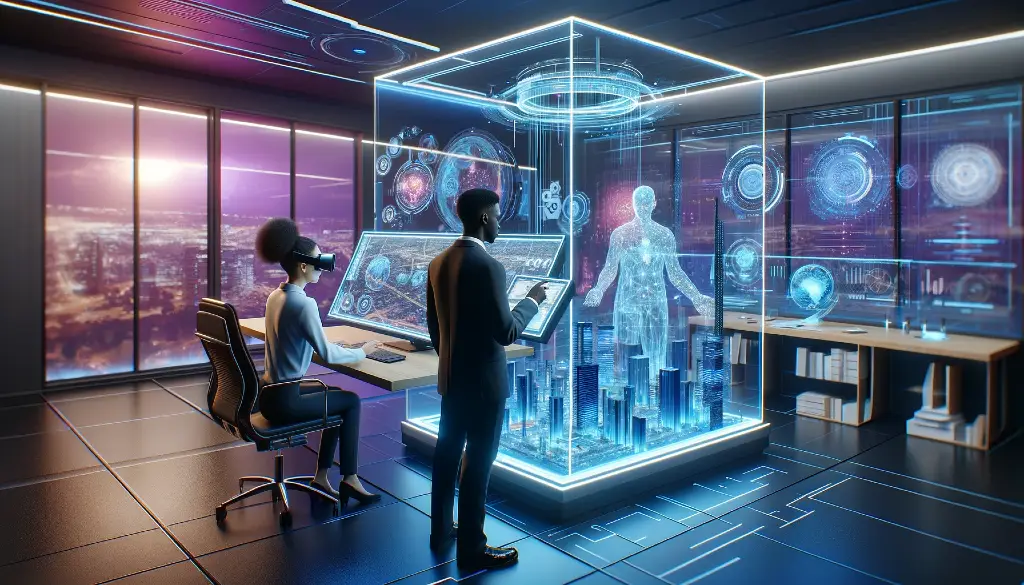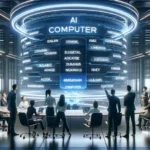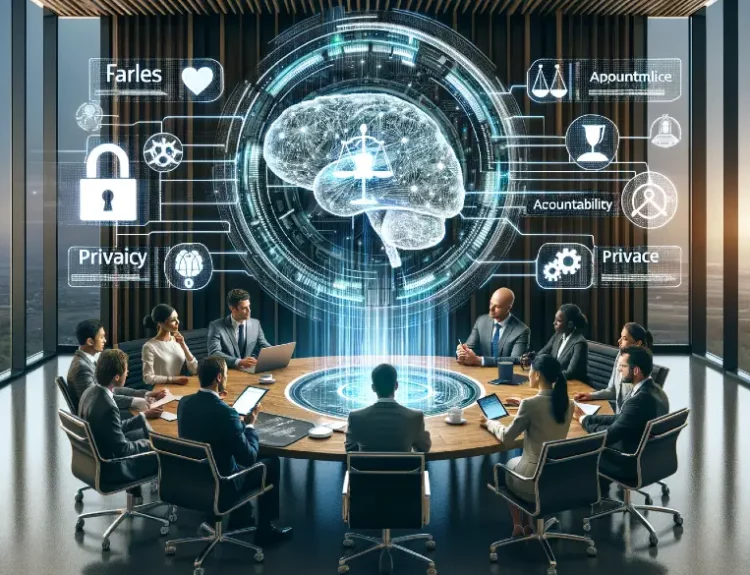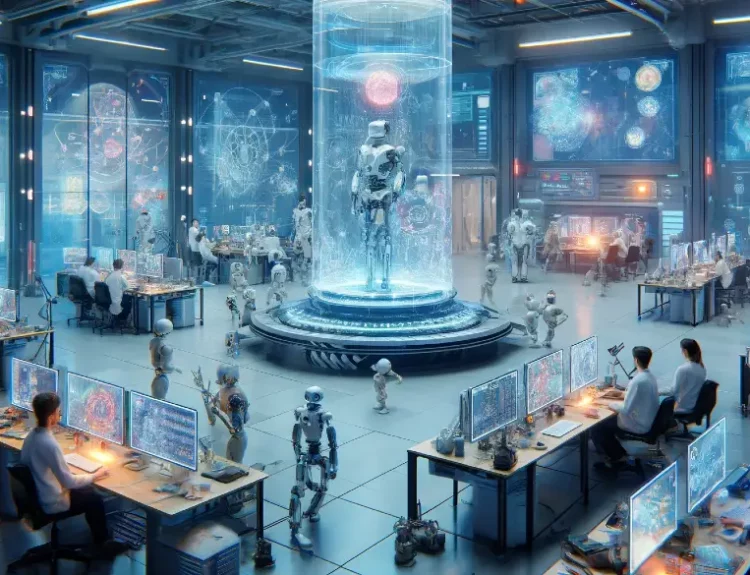Introduction
Imagine a computer room that anticipates your needs before you even walk in. The temperature adjusts to your comfort level, lights dim or brighten based on your workload, and the background noise fades away to a calming hum. This isn’t science fiction, it’s the future of work powered by Artificial Intelligence (AI).
AI computer rooms are no longer a futuristic vision; they’re on the horizon, poised to revolutionize the way we work. By leveraging AI algorithms and machine learning (ML), these intelligent spaces will optimize every aspect of the computer environment, from resource allocation to noise reduction, ultimately leading to a more productive and personalized work experience. Buckle up, because we’re about to delve into the exciting world of AI computer rooms and explore how they’ll transform the future workspace.
The Rise of AI in Workspaces
The modern workplace is undergoing a significant transformation fueled by the relentless march of technology. Artificial intelligence (AI) is rapidly emerging as a game-changer, permeating various aspects of our work lives. From automating repetitive tasks to providing data-driven insights for better decision-making, AI is poised to significantly enhance efficiency and productivity across industries.
The benefits of AI go beyond mere automation. AI systems can analyze vast amounts of data to identify patterns and trends that might escape the human eye. This allows businesses to make informed decisions about resource allocation, staffing needs, and even workplace design. Additionally, AI can personalize the work experience by tailoring tasks and tools to individual preferences and skill sets.
However, it’s important to acknowledge the ethical considerations surrounding AI implementation in the workplace. Issues like bias in algorithms and potential job displacement due to automation need to be addressed proactively. Responsible development and deployment of AI will be crucial to ensure a smooth and beneficial transition for both businesses and employees.
AI in Computer Rooms
Step into the computer room of tomorrow, a space transformed by the magic of AI. Gone are the days of fiddling with thermostats or battling distracting noise. AI computer rooms are intelligent environments designed to optimize your comfort, focus, and ultimately, your productivity.
Let’s delve into the exciting possibilities:
- AI-driven room optimization: Imagine a room that learns your preferences. AI algorithms can analyze temperature and lighting data to automatically adjust settings based on real-time occupancy and usage patterns. Feeling a bit chilly? The AI will subtly raise the temperature to your ideal comfort zone. Need to focus on a demanding task? The lights will dim to create a concentrated atmosphere.
- AI applications in room management: Forget the scramble for a free computer or the frustration of dealing with outdated equipment. AI can streamline resource allocation, directing users to available workstations and even optimizing power and bandwidth based on real-time needs. Additionally, automated scheduling and booking systems powered by AI can eliminate wasted time and ensure everyone has the resources they need, when they need them.
- AI algorithms for space utilization: AI doesn’t stop at optimizing comfort and resources. It can also transform the physical layout of the computer room. Imagine AI algorithms analyzing user behavior and space utilization data. This data can then be used to optimize computer placement, create more efficient workflows, and identify underutilized areas for potential repurposing.
Enhancing Productivity with AI Technology
The impact of AI in computer rooms extends far beyond creating a comfortable work environment. It has the potential to significantly enhance the productivity of every individual working within the space. Here’s how:
- Improved environmental conditions: AI-driven adjustments to temperature and lighting can directly impact employee focus and concentration. Imagine walking into a perfectly balanced environment that eliminates distractions and optimizes your cognitive state. This translates to less wasted time spent adjusting personal settings and more time spent on focused work.
- Streamlined access to resources: No more hunting for a free computer or waiting for IT support to resolve minor technical issues. AI can automate resource allocation, guiding users to available workstations and even pre-loading necessary software based on their scheduled tasks. This reduces downtime and allows employees to seamlessly transition between projects, maximizing their overall efficiency.
Advanced AI Systems for Workspace Optimization
The capabilities of AI computer rooms extend beyond basic automation. By incorporating advanced AI systems like machine learning (ML) and artificial general intelligence (AGI), these spaces can take optimization to a whole new level:
- Self-learning AI systems: Imagine a computer room that continuously learns and adapts. ML algorithms can analyze historical data and user behavior to refine environmental controls and resource allocation over time. This ensures a constantly evolving workspace that perfectly anticipates and accommodates the ever-changing needs of its users.
- Predictive maintenance: AI can go beyond reactive problem-solving to proactive maintenance. Advanced AI systems like AGI can analyze equipment data and predict potential issues before they even arise. This allows for preventative maintenance, minimizing downtime and ensuring the smooth operation of the computer room.
The Future of AI in Office Environments
The integration of AI in computer rooms is just the tip of the iceberg. As AI technology continues to evolve, it will have a profound impact on the overall design and functionality of office environments:
- Increased flexibility and adaptability: AI-powered office spaces can be configured to adapt to different needs in real-time. Imagine conference rooms that automatically adjust lighting and acoustics based on the size and nature of the meeting. Or, picture collaborative workspaces that dynamically transform based on project requirements.
- Personalized workspace experiences: Forget one-size-fits-all office layouts. AI can analyze individual preferences and work styles to personalize the workspace experience. Imagine an employee walking into their “assigned area” where the lighting, temperature, and even background music have been pre-configured to maximize their productivity and comfort.
The future of work is intelligent, adaptive, and built around the needs of the individual. By embracing AI in computer rooms and throughout the office environment, we can create a future where technology seamlessly augments our work experience and empowers us to achieve greater levels of productivity and success.
Join the Verdict Community
The future of AI in workspaces is exciting, but it’s not something we have to wait for passively. At Verdict, we’re actively shaping that future by building an AI platform for developing cutting-edge AI solutions. We believe AI should be human-centric and evolve through real-world interactions.
That’s where you come in! Every search, chat, and shared result on Verdict contributes to a more robust and intelligent AI that understands and grows alongside us. By joining our community, you’ll be playing a vital role in building the future of work.
Here’s how you can get involved:
- Visit our website: Learn more about Verdict AI Chat and our mission to create future-proof AI solutions.
- Join the conversation: Share your thoughts and ideas on AI in the workplace through our forum and discussion boards.
- Contribute to our data pool: Every share on Verdict AI Search helps refine our AI and shape its development.
Together, we can build an AI-powered future of work that empowers individuals and unlocks new levels of productivity and success.
Conclusion
The journey towards AI-powered computer rooms and intelligent workspaces has begun. As AI technology continues to evolve, it holds immense potential to transform the way we work. From creating personalized and optimized environments to streamlining workflows and enhancing productivity, AI offers exciting possibilities for the future of work.
Ready to explore more ways AI is revolutionizing the workplace? Check out our blog page for insightful articles like:
- Securing Data: AI’s Role in Computer Backup Solutions
- Revolutionizing Computing: AI in Computer Rigs
- And many more!
We believe AI is not just a tool, but a collaborator. By embracing its potential and fostering a human-centric approach to its development, we can create a future of work that benefits everyone.










